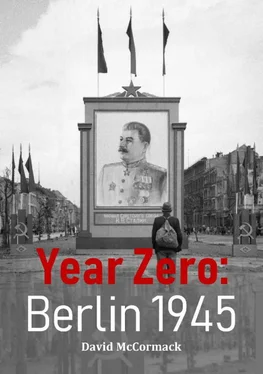The war has reached a stage at which only the full efforts of the nation and of each individual can save us. The defence of our freedom no longer depends on the army fighting at the front. Each civilian, each man and woman and boy and girl must fight with unequalled fanaticism. The enemy expects that, once his tanks have broken through, they will find no resistance. He believes that we will be so disconcerted by his material superiority that we will let things take their course, without caring how they turn out. We must prove the enemy’s hopes wrong. No village and no city may give in to the enemy. The enemy is strong, but not strong enough to hold all of the territory of the Reich without our help. If he persuades us to capitulate, he will have an easy time with us. The enemy has laid waste to our cities and provinces through the worst and most terrible bombing terror. As long as we are determined to resist at all costs, we cannot be beaten, and for us not being beaten means to be victorious.
This war of nations demands heavy sacrifice. Still, these sacrifices do not begin to compare with those that we would have to make if we lose… In the midst of a thousand battles, burdens and defeats, our people stand unbroken. Our hearts are proud when we hear from the enemy the wild fanaticism they encounter, how fathers, mothers and even children gather to resist the invaders, how boys and girls throw hand grenades and mines or shoot from cellar windows without regard to danger… The enemy’s attacks are riskier than the methods we use to resist… A nation that defended its freedom with all its resources has never yet been defeated…
Our entire war effort requires revolutionary changes. The old rules of war are outdated, and have no use at all in our present situation… When whole peoples are threatened, whole peoples must defend themselves. The enemy does not wish to take a province from us or push us back to more favourable strategic borders, he wants to cut our very arteries by destroying our mines and factories, destroying our national substance. If he succeeds, Germany will become a cemetery. Our people will starve and perish, aside from the millions who will be deported to Siberia as slave labour…
Each must start with himself, banishing all weakness and lethargy. He must stand firm and give an example to others, he must be on guard when he hears defeatism… No one can leave it to anyone else. We are all in the same boat that is ploughing through the storm… That is how things are… Raising up the white flag means giving up the war and shamefully losing one’s life…
We still live and breathe, and have mountains of resistance left in us that we only need to draw upon… A fourteen-year-old lad crouching with his bazooka behind a ruined wall on a burned out street is worth more to the nation than ten intellectuals who attempt to prove that our chances are nil… Whether things balance or not depends on us alone… Final victory will be ours. It will come through tears and blood, but it will justify all the sacrifices we have made.
The tone of Goebbels’ appeal to the people was simple. He was basically saying fight on, or die horribly at the hands of victors who would demand their pound of flesh. In truth, this last publication was nothing more than a mass invitation to suicide for what remained of the shrinking German Reich.
During the course of 22 April, the Soviet stranglehold threatened to cut off Berlin completely as Zhukov and Konev deployed their combined total of five rifle and four tank armies for the final push. At 10.00hrs, 3 rdShock Army attacked, taking the former Communist area of Weissensee quickly. Meanwhile, 5 thShock Army, supported by 12 thguards Rifle Corps and 11 thTank Corps smashed their way into Kaulsdorf, Biesdorf and the eastern defences at Karlshorst. To the south, the command headquarters at Zossen had been captured intact. Konev’s troops quickly moved on with one column of tanks heading for Potsdam, another for the southern defensive zones along the Teltow Canal. While the Soviet juggernaut ground relentlessly on, Hitler waited nervously for news of Steiner’s attack. With each passing hour, Hitler became more irritable as General Krebs was unable to offer him any definite information.
The military situation conference was held in the bunker at 15.00hrs that afternoon. Overriding Krebs’ usual sugar coating of the situation, General Jodl informed Hitler that the Oder Front had all but collapsed, that 9 thArmy was surrounded and that General Weidling’s 56 thPanzer Corps could not be located. He went on to say that the city was almost cut off and that within a week the forces of Zhukov and Konev would meet up thus sealing off the Reich capital completely. Irritated by Jodl’s gloomy prognosis, Hitler demanded to know when Steiner’s forces would come to the relief of the city. Krebs was forced to concede that Steiner had been unable to mobilise enough men and that as a consequence no relief from that source could be expected.
What followed was one of the most astonishing moments in the history of the Third Reich. Hitler, the man who had brought about the catastrophe completely lost control, hurling accusations against the officer corps who he claimed had failed to carry out his great schemes because of their cowardice, treachery and lies. After this explosion of anger, Hitler collapsed into his chair exhausted. To the astonishment of those present, he then declared that the war was lost. He would remain in the city to meet his death, but those who wished to leave could, because he no longer felt able to lead them. It was left to Jodl to point out that their Fuhrer could not desert the nation in its greatest hour of need, going on to say that there was still hope, in that reserves in the form of General Walther Wenck’s 12 thArmy were still available. Later that day, Hitler’s mood improved somewhat as he was persuaded by Keitel, Krebs, Burgdorf and Jodl that Schorner’s Army Group was still strong, that Wenck’s 12 thArmy could be turned around from the Elbe, and that given a few days, Steiner would be able to launch an attack from the north.
Meanwhile, news of Hitler’s collapse had reached Goering who had left Berlin for the comfort of his residence at Obersalzberg. General Koller arrived at noon to confirm the reports and to urge the indolent Reich Marshal to take immediate action. Also present was Philipp Bouhler, a senior government official and Chief of the Chancellery of the Fuhrer. Goering was at first cautious, asking if Hitler had appointed Bormann as his successor. Bormann was regarded by Goering as his enemy, and as such he pondered the possibility that the Machiavellian eminence grise of the Nazi court may have laid a trap for him, stating that, ‘If I act, he will call me a traitor; if I don’t, he will accuse me of having failed at a most critical time’. Goering sent for Hans Lammers, a legal expert and head of the Reich Chancellery to get his opinion. Lammers could only say that as far as he was aware, Goering was still Hitler’s nominated successor.
For Goering, the question of whether Hitler was still able to exercise command remained. Until this question was answered, a legal assumption of power was not possible. Therefore, a carefully worded telegram was sent by Goering to Berlin in order to clarify the position regarding the future leadership of the Reich:
My Fuhrer: General Koller today gave me a briefing on the basis of communications given to him by Colonel General Jodl and General Christian, according to which you had referred certain decisions to me and emphasised that I, in case negotiations would become necessary, would be in an easier position than you in Berlin. These views were so surprising and serious to me that I felt obligated to assume, in case by 22.00 o’clock no answer is forthcoming, that you have lost your freedom of action. I shall then view the conditions of your decree as fulfilled and take action for the well being of Nation and Fatherland. You know what I feel for you in these most difficult hours of my life and I cannot express this in words. God protect you and allow you despite everything to come here as soon as possible. Your faithful Hermann Goering.
Читать дальше












